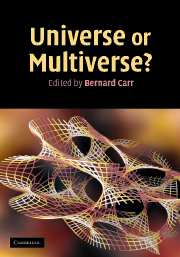Book contents
- Frontmatter
- Contents
- List of contributors
- Preface
- Acknowledgements
- Editorial note
- Part I Overviews
- Part II Cosmology and astrophysics
- Part III Particle physics and quantum theory
- Part IV More general philosophical issues
- 20 Scientific alternatives to the anthropic principle
- 21 Making predictions in a multiverse: conundrums, dangers, coincidences
- 22 Multiverses: description, uniqueness and testing
- 23 Predictions and tests of multiverse theories
- 24 Observation selection theory and cosmological fine-tuning
- 25 Are anthropic arguments, involving multiverses and beyond, legitimate?
- 26 The multiverse hypothesis: a theistic perspective
- 27 Living in a simulated universe
- 28 Universes galore: where will it all end?
- Index
- References
26 - The multiverse hypothesis: a theistic perspective
Published online by Cambridge University Press: 05 July 2014
- Frontmatter
- Contents
- List of contributors
- Preface
- Acknowledgements
- Editorial note
- Part I Overviews
- Part II Cosmology and astrophysics
- Part III Particle physics and quantum theory
- Part IV More general philosophical issues
- 20 Scientific alternatives to the anthropic principle
- 21 Making predictions in a multiverse: conundrums, dangers, coincidences
- 22 Multiverses: description, uniqueness and testing
- 23 Predictions and tests of multiverse theories
- 24 Observation selection theory and cosmological fine-tuning
- 25 Are anthropic arguments, involving multiverses and beyond, legitimate?
- 26 The multiverse hypothesis: a theistic perspective
- 27 Living in a simulated universe
- 28 Universes galore: where will it all end?
- Index
- References
Summary
Introduction
In articles published in physics journals, the multiverse hypothesis is strictly regarded from a non-theistic perspective, as a possible explanatory hypothesis for the life-permitting values of the constants of physics. Further, there have been several attempts to make specific predictions with regard to the values of these constants from a multiverse hypothesis, such as the value of the cosmological constant [1—3]. Such approaches reflect the legitimate methodological naturalism of physics. However, in wider-ranging philosophical discussions of the multiverse hypothesis — as found in various books on the topic — the issue arises as to what is the relation between the multiverse hypothesis and much larger philosophical issues, particularly whether reality is ultimately impersonal or personal in nature. In such contexts, the multiverse hypothesis is often presented as the atheistic alternative to a theistic explanation — such as that offered by John Polkinghorne [4] — of the purported fine-tuning of the cosmos for intelligent life. In this contribution, I will attempt to explain why, contrary to the impression one often gets, contemporary physics and cosmology are not only compatible with theism, but could arguably be thought to suggest a theistic explanation of the Universe or multiverse. I do not expect necessarily to convince anyone of the theistic point of view, realizing that many factors — both theoretical and personal — underlie our views of the ultimate nature of reality.
- Type
- Chapter
- Information
- Universe or Multiverse? , pp. 459 - 480Publisher: Cambridge University PressPrint publication year: 2007
References
- 10
- Cited by



